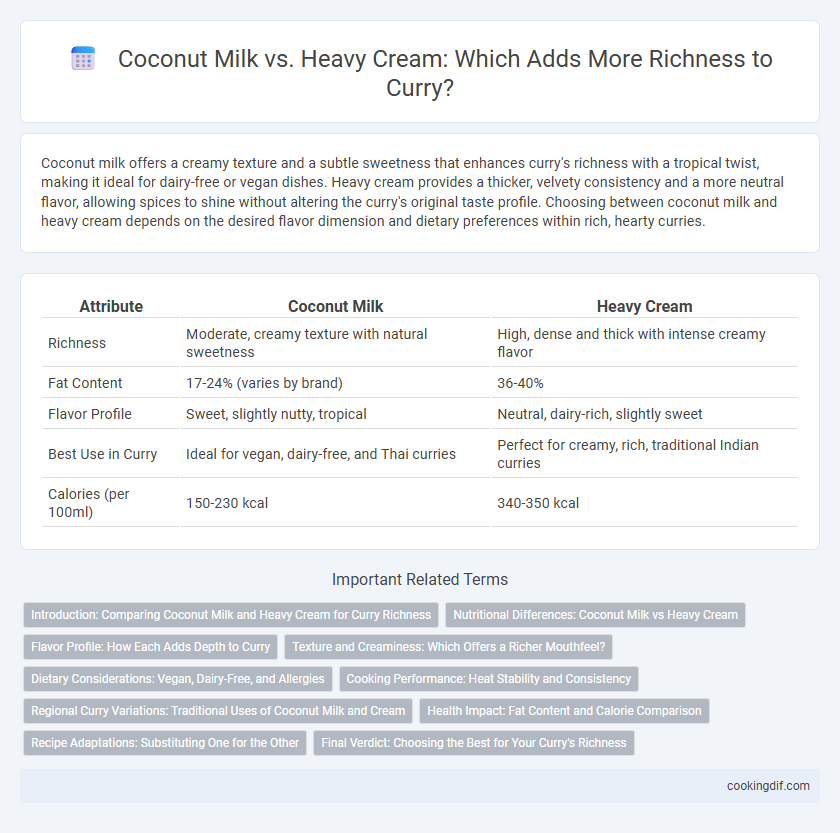Coconut milk offers a creamy texture and a subtle sweetness that enhances curry's richness with a tropical twist, making it ideal for dairy-free or vegan dishes. Heavy cream provides a thicker, velvety consistency and a more neutral flavor, allowing spices to shine without altering the curry's original taste profile. Choosing between coconut milk and heavy cream depends on the desired flavor dimension and dietary preferences within rich, hearty curries.
Table of Comparison
| Attribute | Coconut Milk | Heavy Cream |
|---|---|---|
| Richness | Moderate, creamy texture with natural sweetness | High, dense and thick with intense creamy flavor |
| Fat Content | 17-24% (varies by brand) | 36-40% |
| Flavor Profile | Sweet, slightly nutty, tropical | Neutral, dairy-rich, slightly sweet |
| Best Use in Curry | Ideal for vegan, dairy-free, and Thai curries | Perfect for creamy, rich, traditional Indian curries |
| Calories (per 100ml) | 150-230 kcal | 340-350 kcal |
Introduction: Comparing Coconut Milk and Heavy Cream for Curry Richness
Coconut milk provides a naturally sweet and tropical richness to curry, enhancing flavors with its creamy texture and subtle nutty taste, making it ideal for vegan or dairy-free diets. Heavy cream offers a thicker, more velvety mouthfeel with a higher fat content, contributing to a luxurious and smooth consistency that balances spices in traditional curries. Choosing between coconut milk and heavy cream depends on dietary preferences and desired flavor profiles, with coconut milk adding a distinctive, aromatic depth and heavy cream delivering indulgent creaminess.
Nutritional Differences: Coconut Milk vs Heavy Cream
Coconut milk contains medium-chain triglycerides (MCTs) and provides a dairy-free, vegan-friendly fat source with lower saturated fat compared to heavy cream, which is rich in saturated fats and cholesterol. Heavy cream offers higher calories and fat content, supplying fat-soluble vitamins A, D, E, and K, while coconut milk delivers more potassium and certain antioxidants beneficial for heart health. Choosing coconut milk in curry recipes enhances richness with plant-based nutrients, whereas heavy cream adds a thicker texture and creamier mouthfeel, impacting both flavor profile and nutritional intake.
Flavor Profile: How Each Adds Depth to Curry
Coconut milk imparts a natural sweetness and subtle nuttiness that enhances the aromatic spices in curry, creating a rich, tropical flavor profile. Heavy cream adds a luxurious, velvety texture with a mild dairy richness that balances spicy and tangy notes, deepening the overall mouthfeel. Both ingredients elevate curry by contributing distinct layers of creamy depth, with coconut milk offering a lighter, fruitier undertone and heavy cream providing a buttery, indulgent finish.
Texture and Creaminess: Which Offers a Richer Mouthfeel?
Coconut milk provides a smooth, silky texture with a natural creaminess that enhances curry's richness without overwhelming its spices. Heavy cream offers a thicker, denser mouthfeel, lending a velvety, indulgent quality that intensifies the dish's overall richness. The choice between coconut milk and heavy cream depends on whether a lighter, tropical creaminess or a richer, more buttery texture is desired in the curry.
Dietary Considerations: Vegan, Dairy-Free, and Allergies
Coconut milk serves as an excellent vegan and dairy-free alternative to heavy cream, making it suitable for those with lactose intolerance or dairy allergies. Heavy cream provides a richer, creamier texture but is unsuitable for vegans and individuals with dairy sensitivities. Choosing between coconut milk and heavy cream depends on dietary restrictions and the desired richness in curry recipes.
Cooking Performance: Heat Stability and Consistency
Coconut milk offers excellent heat stability, maintaining a smooth texture and preventing curdling during prolonged simmering, ideal for curries requiring extended cooking times. Heavy cream provides a rich, velvety consistency but is more prone to separation or curdling when exposed to high heat or acidic ingredients. Choosing coconut milk enhances cooking performance in spicy or long-cooked curries, while heavy cream delivers a creamier texture best suited for recipes with gentle heat.
Regional Curry Variations: Traditional Uses of Coconut Milk and Cream
Coconut milk is a staple in South Indian and Southeast Asian curries, providing a naturally sweet and rich base that enhances spices without overpowering the dish. Heavy cream, favored in North Indian and some Caribbean curries, delivers a thicker, more indulgent texture and richer mouthfeel, complementing robust spice blends. Regional curry variations highlight coconut milk's use for lighter, aromatic curries, while heavy cream enriches hearty, cream-based gravies characteristic of Northern culinary traditions.
Health Impact: Fat Content and Calorie Comparison
Coconut milk contains medium-chain triglycerides (MCTs) that may boost metabolism but has a higher saturated fat content compared to heavy cream, which is richer in long-chain saturated fats. Heavy cream offers more calories and saturated fat per serving, contributing to higher cholesterol levels, while coconut milk provides a dairy-free alternative with fewer calories but a distinctive flavor. Choosing between them depends on dietary needs, with coconut milk favored for plant-based diets and heavy cream preferred for traditional, richer curry textures.
Recipe Adaptations: Substituting One for the Other
Coconut milk offers a dairy-free alternative rich in healthy fats, enhancing curry recipes with a subtle sweetness and tropical aroma, while heavy cream provides a thicker, more neutral base that intensifies richness without altering the dish's flavor profile. Substituting heavy cream with coconut milk requires adjusting spices and seasoning to balance the additional coconut undertones, ideal for vegan or lactose-intolerant adaptations. Conversely, replacing coconut milk with heavy cream increases creaminess and smoothness, making it suitable for traditional curry recipes that require a luscious texture without the distinctive coconut taste.
Final Verdict: Choosing the Best for Your Curry's Richness
Coconut milk offers a naturally sweet, tropical creaminess ideal for enhancing curries with a subtle richness and a dairy-free option. Heavy cream provides a thicker, more indulgent texture and a neutral flavor that deepens the curry's richness without altering the spice profile. For authentic, health-conscious curries, coconut milk is preferred; heavy cream is best for ultra-rich, creamy textures where dairy is suitable.
Coconut milk vs Heavy cream for richness Infographic

 cookingdif.com
cookingdif.com